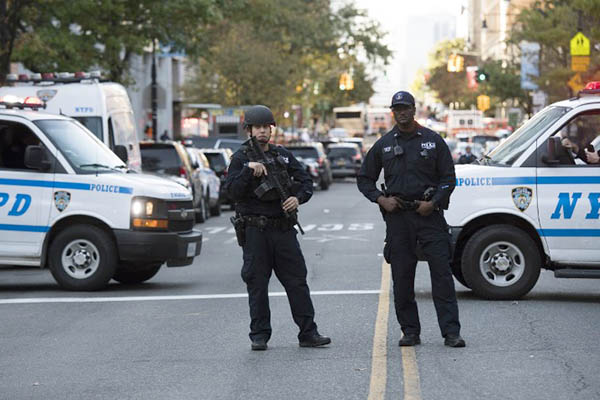
File photo. Don Emmert—AFP
While there have not been any directives from terror groups, supporters have disseminated propaganda encouraging holiday attacks
The abortive bombing by an Islamic State-inspired Bangladeshi in New York has raised fresh fears of a possible surge in attacks during the year-end holiday season on both sides of the Atlantic.
Akayed Ullah, a 27-year-old immigrant who mainly injured himself when he tried to detonate a pipe bomb in a New York subway on Monday, reportedly told investigators that he targeted the station based on the Christmas posters on the walls. The explosion, which saw three others lightly injured, came two weeks before Christmas, a period which terror experts says offers potential terrorists a large choice of “soft targets” where many people are gathered, shopping and celebrating, with limited ability to protect them.
I.S.-inspired militants carried out two devastating attacks in Europe during the holiday season last year. In one, a Tunisian refugee drove a large truck into a crowd at a Christmas market in Berlin, killing 11 and injuring dozens more. A week later, a jihadist militant shot dead 39 people at a New Year’s Eve party at an Istanbul nightclub.
In November 2016, French police broke up an Islamic extremist ring that was weighing an attack on a Christmas market as well as Paris Disneyland in the weeks before Dec. 25 holiday. This year, such markets around the continent have a heavier police presence and more concrete blocks to prevent possible vehicle attacks.
The U.S. State Department has issued an alert for travelers to Europe during the holiday season, reminding them of both the Berlin and Istanbul attacks. “U.S. citizens should exercise caution at holiday festivals and events,” the State Department warned. “Extremists continue to focus on tourist locations, transportation hubs, markets/shopping malls and local government facilities as viable targets.”
U.S. authorities have also put out a general domestic warning over possible season-based attacks, according to Christopher Krebs, a senior Department of Homeland Security official. “We’re focused on general awareness with the general public, like ‘see something, say something,’” he said.
Analysts say there have not been any public directives from any of the authoritative media channels of Islamic State, Al Qaeda or related groups. But for weeks, supporters have disseminated propaganda encouraging holiday-period attacks.
SITE Intelligence Group, which monitors jihadist websites, has shown posters made to encourage Christmas attacks. In one, a Santa stands next to a box of explosives looking over New York’s Times Square, with the text: “We meet at Christmas in New York… soon.” Another depicts a European city with a warning in three languages: “Soon on your holidays.”
Such propaganda underscores the move of Islamic State to an online “virtual caliphate” after the successful campaign to break up its territory in Syria and Iraq over the past year. Rather than plot attacks from a central command, the group now seeks to guide lone attackers online.
“It is adapting its model, looking to inspire individuals operating overseas, rather than trying to direct and command and control them,” Nick Rasmussen, director of the U.S. National Counterterrorism Center, said on PBS television on Monday. “That’s a different model of terrorism. It’s harder to prevent.”
The Christmas-New Year threat is a perennial one, said Jeff Ringle, a former FBI counterterror official who now heads the Soufan Group security consultancy. “Holidays have always raised the threat alarm,” he told AFP, saying the expanded ability of soft targets—public places where many people gather, like concerts and markets—would give an attacker “a lot of visibility in the news.”
Preventing them is particularly difficult. “In order to allow people to enjoy the holidays, law enforcement has to be on their toes. It can never be completely effective,” Ringle said.
